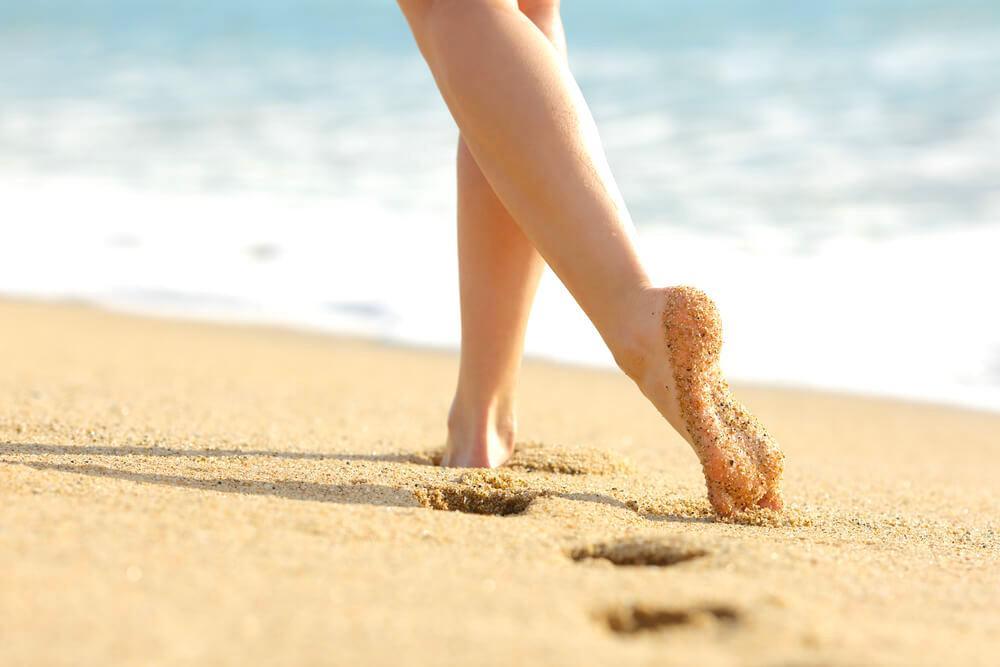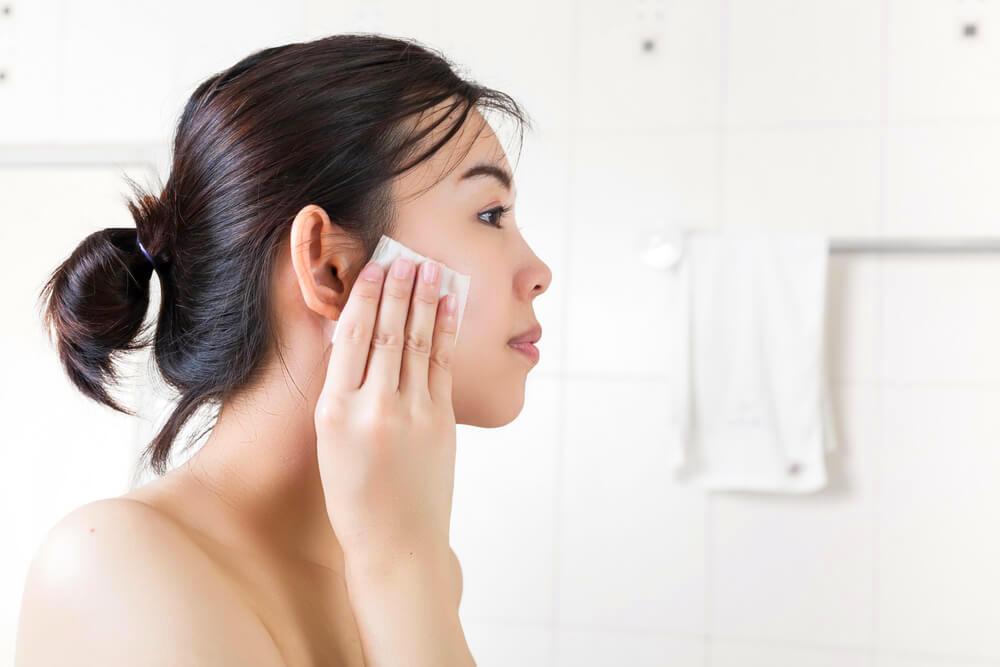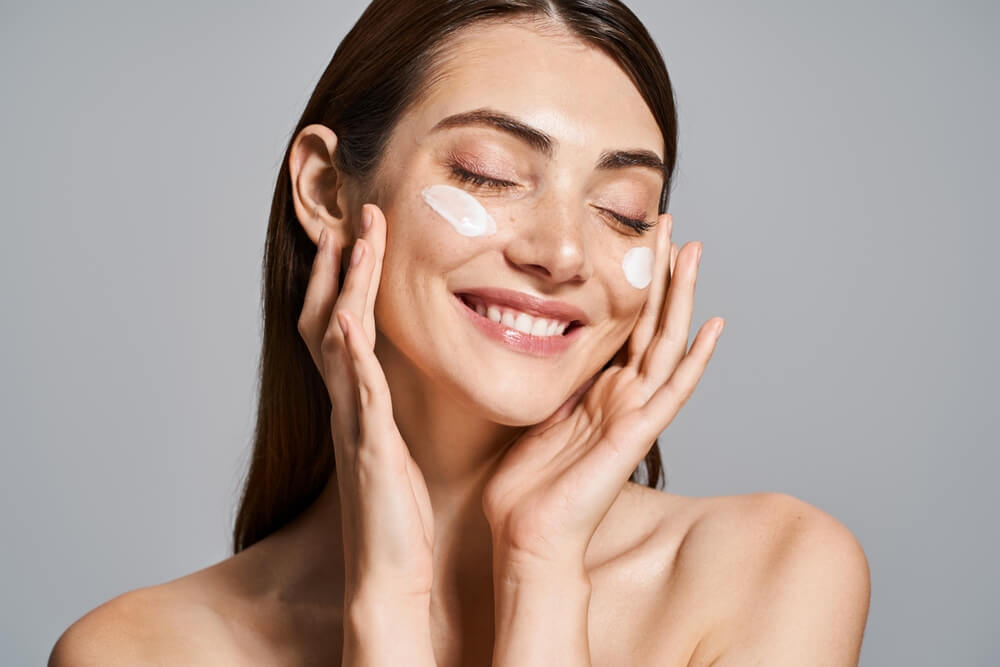Planning a trip to the beach?
If so, make sure you read up on these 12 beach-day skin care tips, so that you can take all of the steps necessary to protect your skin.
1) Stop Using AHAs
Do you currently use AHAs, also known as alpha hydroxy acids, to exfoliate your skin?
If so, this is something that you need to stop if you know that you are going to be spending some time at the beach.
Why?
Because AHAs have been shown to increase the skin’s sun sensitivity by up to 50%, with the FDA themselves recommending heavy use of sunscreen when using AHAs.
Rather than take this risk, you are best off opting for a different method of exfoliating your skin, at least until you know that you will be spending more time indoors again.
2) Sunscreen is Essential
You probably already know that the sun is bad for your skin, but here is a quick rundown of some of the reasons why:
- Causes skin cancer, which accounts for nearly half of all diagnosed cases of cancer
- Leads to the formation of wrinkles. In fact, up to 85% of facial wrinkles are caused by sun exposure
- Exacerbates inflammatory skin conditions
- Causes uneven pigmentation
- Causes the skin to lose its elasticity
As you can see, the sun is something that you really do need to protect your skin from.
Sunscreen is the best way to do this, because while there may not be a sunscreen out there that can protect your skin from 100% of the sun’s UV rays, going for something with SPF 30 will still shelter your skin from 97% of the sun’s rays.
Of course, this all depends on how much you apply, as well as how often you re-apply it.
You should be aiming to use about a shot glass worth of sunscreen to cover your body, and be re-applying this every couple of hours, or more often if you have been in the water or sweating.

Don’t forget…
There are certain areas on the body where people often forget to apply sunscreen, meaning that these awkward areas are often the parts that end up sunburnt. Make sure that you apply sunscreen to literally every single part of your body, including your hairline, ears, and toes.
Of course, if you are applying sunscreen to your face, then you do need to make sure that the formula you use is safe to be used on the face.
Planning on staying in the shade?
This does not mean that you can skip out on the sunscreen, especially at the beach, as the water reflects the sun’s rays, bouncing them over to you no matter where you are.
3) Don’t Forget to Bring Your Sun-Protecting Accessories
In addition to using sunscreen, there are also other accessories that can help to protect your skin from the sun.
A pair of sunglasses, along with a wide-brimmed hat, will help to give your eyes and your face some extra protection. Since the skin here is much thinner and more delicate than the skin on the rest of your body, taking these steps is important.
When it comes to your body, a loose dress, t-shirt or sarong will help to give your skin some cover.
If you plan on lounging about on the beach, a beach umbrella can also be extremely useful when it comes to blocking a large amount of the sun’s rays.
4) Stay in the Shade During the Hottest Hours of the Day
While you may be tempted to frolic about in the open sun for the whole day, your skin will thank you if you stay in the shade during the sun’s hottest hours.
Wondering when these hours are?
Between around 11am and 4pm, although this does vary depending on where in the world you are.
5) Stay Hydrated
It is so easy to quickly become dehydrated at the beach, and not only is this bad for your body, but the lack of water will also cause your skin to look and feel dull and dry.
Don’t forget…
In addition to drinking plenty of water, there are other ways in which you can stay hydrated.
Try snacking on water-rich foods, such as watermelon, as these are especially refreshing when enjoyed at the beach. Other fresh fruits that have a high water content include:
- Peaches
- Pineapples
- Celery
- Tomatoes
- Bell peppers
- Strawberries
If coconuts are available, then a drink of coconut water is a must, as this is packed with electrolytes, making it incredibly hydrating. Don’t forget to eat the flesh too, as this also has a wide range of health benefits.
6) Make the Most of the Saltwater
If you are at a beach, then there is a high chance that you have access to plenty of saltwater.
Did you know that this is an ingredient that can actually be extremely beneficial for the skin?
Here are some of the ways in which saltwater can help your skin:
- Packed with magnesium, potassium and calcium, each of which help to treat various skin conditions
- Absorbs toxins on and in the skin, even those that cause acne
- Gently exfoliates the skin
7) Make the Most of the Sand
Not only is the saltwater good for your skin, but so is the sand, making the beach almost like a natural spa.
Wondering what the sand does?

It acts as a natural exfoliant, and a short walk in wet sand will have your feet feeling so much softer and smoother. When walking along the beach, try giving your feet an extra rub in the sand, as this will help to really scrub away rough skin and dead skin cells.
8) Protect Your Lips Too
Many people tend to forget about the skin on their lips, but this neglect can lead to everything from dryness to cold sores.
Not sure how to protect your lips?
All you need is a nourishing lip balm, but make sure that it contains SPF.
9) Be Prepared for Sunburns
Although you may be trying your very best to avoid getting sunburnt, this can sometimes still happen.
If it does, you need to ensure that you are prepared for this, and have brought all of the necessary products with you.
So, what should you do if you are on the beach and can feel your skin beginning to burn?
The very first step is to head indoors, as the last thing your skin needs right now is more sun. Make sure that you find somewhere with proper shade, and not just an umbrella or awning.
Then, it is time to cool your skin down, either with cooling packs or in a cold shower. However, if you choose to shower, make sure that the water pressure is quite light, and that you do not remain in the shower for more than a few minutes. Any longer, and the water may end up drying out your already damaged skin.
Once your skin has calmed down a bit, apply a layer of moisturizer, followed up with some aloe vera.
Wondering why this is such a popular after sun ingredient?
Research has shown that aloe vera can help promote skin healing after a burn, whether this burn came from the sun or anywhere else. It is also extremely moisturizing, helping your skin to avoid any peeling or scabbing.
Could your skin do with some extra help, in addition to the aloe vera?
There are many other natural ingredients out there that can help with a sunburn, including:
- Peppermint oil – soothes burnt areas by providing a cooling sensation
- Lavender oil – reduces the string and redness of a sunburn, while encouraging skin to heal faster
- Oatmeal – reduces inflammation
- Tea – reduces redness while speeding up the healing process
Keeping your sunburn products in the fridge will provide your skin with additional coolness when applied, helping to soothe it even more.
Finally, make sure that you have some loose clothing with you. If you do get sunburnt, you definitely will not want to be wearing tight clothing that rubs against your body.
10) Pack Some SPF Foods for Snacks
Did you know that there are certain foods out there that can actually increase your body’s ability to protect itself from the sun?
While they should definitely not be a replacement for sunscreen, these foods will still help to protect your skin slightly more from the sun’s damaging effects, while helping to prevent your skin from burning.
You are probably wondering…
Which foods do I need to be eating?
Just about any fruit or vegetable that is red in color, whether this may be strawberries or tomatoes, will have this effect.
11) Go Easy on the Makeup
When spending the day at the beach, heavier makeup looks should be avoided, and all you really need is a couple of light touches of certain products.
When it comes to foundation, skip this completely.
Wondering what to use instead?
Opt for a sunscreen that has a matte finish. Since you will need to continuously re-apply this throughout the day, a foundation will only end up being troublesome.
With the makeup that you do wear, try opting for mineral makeup formulas whenever possible, as these will last the longest through the sun and sweat.
Do you often use a facial mist when at the beach?
Many makeup brands sell these, but make sure that yours does not contain any alcohol.
Why?
Because these end up being quite drying on the skin. Instead, look for one that has been formulated with floral waters and essential oils, as these will be the most nourishing and beneficial to your skin.
Nevertheless, whichever facial mist you do end up using, make sure that you always follow this up with a layer of moisturizer, or, better yet, sunscreen. This will prevent the mist from evaporating, meaning that it ends up being absorbed by your skin.
12) Cleanse Well at the End of the Day
Feeling tired once you get home after a day at the beach?
While you may want to sink into your bed and have an early night, there is something extremely important that you need to do first…
Wondering what?
The answer is cleansing your skin. Since your skin will have come into contact with so much dirt, bacteria, sand, sweat and more over the course of the day, you need to make sure that you cleanse these away as soon as possible. If not, they will all end up clumping together and clogging up your pores, leading to breakouts and other skin issues.

Make sure that you use a gentle cleanser, on both your face as well as your body. If your skin has come into contact with quite a bit of sand during the day, then exfoliating is something that you will definitely want to skip, as the sand will have already naturally done this itself.
After cleansing, apply a layer of moisturizer to your skin, and follow this up with some of the after sun ingredients mentioned above.
If you really want to treat your skin…
A face mask after a long beach day will have some fantastic benefits. A high quality, hydrating mask will help to counter the drying effects that the sun would have had on your skin throughout the day, while providing your skin with the antioxidants needed to fight any damage that the sun may have caused.
Whether you opt for a sheet mask, a cream mask, or any other type of mask, just make sure that you choose one with a hydrating, skin-boosting formula.
While there is no denying how much fun the beach can be, it can also cause quite a few issues with your skin. Fortunately, if you are prepared, you will not need to worry about any of these problems, and can instead just focus on enjoying yourself.






Leave A Comment